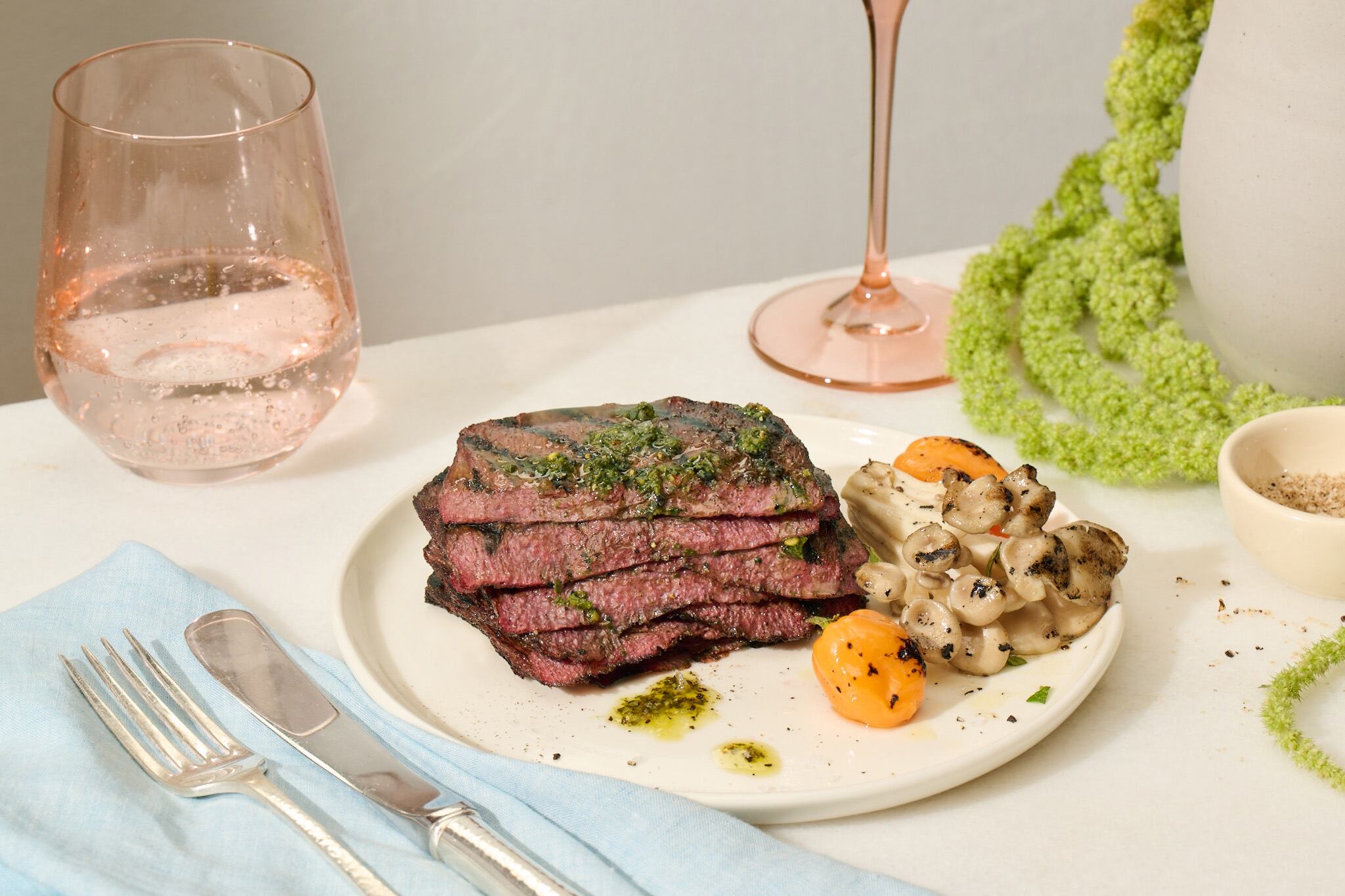After years abroad, Didier Toubia still hasn’t quite shaken his French accent. He dials in from his adopted home, Israel, and we quickly find common ground: we’ve both lived in France, and we both eat far less meat than we used to.
“My first ever job was in a meat processing facility,” he tells me, of his early career in Paris. I can’t help but wonder if that’s what put him off. “So I’ve been around meat almost all my life.”
Today, Toubia still works in meat – only now, it’s the cultivated kind. As co-founder and CEO of Aleph Farms, he’s one of the biggest names in his field, or should I say, his lab. And right now, he’s at an inflection point.
Aleph Farms has received regulatory approval for its cultivated “whole cut”, but is holding off on launching it. Toubia wants to get everything just right – and keeping a close eye on consumer trends is a big part of that.
Meat today is not what it once was
Meat, today, is a commodity product, he tells me. “There’s no ceremony, there’s no respect.” I know he’s thinking back to that internship in Paris.
But even back then, better quality meat was available. In fact, steak was not just available, it was abundant. Those were the days of ‘steak frites’: a flat cut of beef served alongside a modest portion of thin-cut fries. White plate, chequered tablecloth, obligatory glass of red for the adults.
These days, it’s burger-this and burger-that. The only ‘steak’ on the menu is a ‘steak haché’ – a French-style beef patty.
It’s not that Toubia wants to rid the world of burgers. He doesn’t want to completely disrupt the meat industry, just to expand options on the menu.
“Today, industry is making a lot of meat in very concentrated operations to meet demand for animal protein, but if we had other choices and additional ways to make animal proteins, we could diversify supply.”
Aleph Farms leans into hybrid products
This is where cultivated meat comes in, he tells me.
Cultivated meat goes by many names. Some call it “cell-based”, others prefer “cultured”. The food-tech world dislikes “lab-grown”, but the term lingers in public discourse.
Whatever you call it, the process involves cultivating animal cells in a bioreactor to grow muscle and fat cells. They’re harvested, and developed into familiar products like burgers or nuggets.
Toubia has been committed to developing the “holy grail” of cultivated meat – steak – since co-founding Aleph Farms back in 2017. And now he’s done it: the company’s first whole cut product, the cultivated Petit Steak, has received regulatory approval in Israel.

It’s not a 100% cultivated meat product. The Petit Steak, like all products in Aleph Farms’ pipeline, is made from blending cultivated meat with plant-based ingredients. A hybrid, if you will.
The hybrid solution is not a short-term fix for Aleph Farms, a means of quickly getting their product out the door. Even if the company were able to completely replicate structured meat muscle at scale, and at a low cost, Toubia’s not convinced they’d do it.
Developing a new category within meat: cultivated
Why? Because Toubia doesn’t believe cultivated meat should be a one-to-one replacement for conventional meat. “For cultivated meat to be successful in the market, it needs to have a unique value proposition.”
And this unique value proposition is worthy of its own category, he explains, likening hybrid cultivated and plant-based products to the move towards electric vehicles. “I know it’s not the perfect analogy,” he laughs, asking me to bear with him. “Electric vehicles are the same product in a different category within an existing industry. Some people prefer hybrids and some prefer 100% electric, each with its own unique value proposition.”
The perks of a hybrid vehicle are obvious. You’re putting less fossil fuel in the tank, but have greater range than a pure-play electric car. Toubia sees huge benefits in hybrid meat, also.
For cultivated meat to be successful in the market, it needs to have a unique value proposition
Didier Toubia, co-founder and CEO, Aleph Farms
From a technical standpoint, the plant-based matrix gives cultivated meat the structure required for whole cuts. Without it, and without a scaffold to help organise tissue structure, cultivated meat and fat cells struggle to mimic real muscle. It needs muscle fibres and connective tissue, and industry isn’t there yet.
But that’s not the only reason the plant-based matrix works for Aleph Farms, explains Toubia.
The power of plants in cell-based meat
To begin with, blending cultivated meat with plants helps lower cost. The more plants in the matrix, the less cultivated meat required.
Growth medium, which the cells feed on to multiply, remains the main cost in cultivated meat production. Depending on the scale and type of product, it accounts for between 50-80% of the total cost of production.
Aleph Farms plans to achieve price parity over the next three to four years, and Toubia knows that’s a non-negotiable for market success.
Aleph Farms can be profitable within a ‘very short’ timeframe
Aleph Farms expects to reach profitability quickly. Co-founder and CEO Didier Toubia cites a recent techno-economic analysis, showing a “very, very short” path to strong margins. Bioprocess firm Eridia has modelled a projection that Aleph Cuts could achieve 47% gross margins, at price parity with conventional beef, under stated assumptions.
Achieving the right price point isn’t the only challenge facing the cultivated meat industry. The product has to be “right”, too. If brands are to encourage meat-eaters to eat cultivated alternatives from time to time, the product has to be as good – if not better – than the real thing.
“People will not buy an inferior product at a higher price.”
The product should be unique, he stresses. The plant-based ingredients help here, too.
‘Healthy indulgence’ trend amid GLP-1 boom
Cost is not the only challenge. Aside from regulation (more on that later), consumer acceptance of cultivated meat remains a big one – and with very few real-world examples, something of an unknown entity.
But Toubia has a new strategy to ensure Aleph Farms hits the mark with consumers, and it means leaning into modern-day food trends.
One of the biggest consumer trends of the year, if not decade, is demand for high protein. Shoppers want high-protein everything, and it’s infiltrating all food categories, from yoghurts to snacks and breakfast cereals. The trend dovetails with another movement, ‘healthy indulgence’, which reflects demand for permissible, or better-for-you, treats.
“Protein consumption is evolving globally,” explains Toubia. And it’s been accelerated by the use of new weight-loss drugs. GLP-1s, like Ozempic and Wegovy, work by triggering the feeling of fullness, or satiety, meaning that appetites are shrunk and cravings curbed. With the arrival of these new drugs, existing shifts towards smaller, protein-forward, nutrient-dense portions are being propelled.
“Users are looking for smaller portions of foods that contain all the nutrients they need, especially proteins and fibres,” explains Toubia. They also want foods that are low in calories and saturated fats, he adds. “That’s how we’ve tailored our first product.”

It’s the plant-based matrix that offers these benefits: they help reduce calories, lower saturated fat content, and add fibre.
That’s how Aleph Farms expects its Petit Steak to land, once it hits the market: playing to the healthy indulgence trend. “Cultivated meat belongs to the experience of meat, but is differentiated by a unique set of attributes tied to proteins and nutrition,” explains Toubia. He says the goal is to preserve what people love about steak – the texture, tenderness, and juiciness – while making it lighter and more sustainable.
Strategic decisions around commercialisation
Aleph Farms is the only cultivated meat company with regulatory clearance to market cultivated “whole cuts”. And yet, it hasn’t entered the market.
“We decided not to launch last year, when the regulatory approval came through,” he explains. Why? It’s a strategic decision: “We want to complete relatively extensive work we’re doing on cost reduction, scalability, and production improvement.”
Aleph Farms is not the kind of start-up to quickly launch, with the hope of securing initial revenue at all cost, suggests the CEO. Although he understands that some start-ups have felt investor pressure to do so. “That’s exactly what we didn’t want to do. We didn’t want to launch a product that will still be very expensive and not yet ripe for larger scale production.”
At the end of the day, Toubia is convinced that consumers will only pay for the product itself, and not for the way it’s produced. “Selling a cultivated product, be it chicken nuggets or something else, at three times the price won’t work. Being cultivated alone isn’t the right marketing strategy.”
More regulatory progress expected shortly
With the regulatory greenlight secured in Israel, Aleph Farms is now looking further afield. The start-up has also applied in Singapore, and Thailand as an extension to Singapore. Switzerland and the UK have also received applications.
Aleph Farms invests in Switzerland with manufacturing hub
For more proof of Aleph Farms' focus on EMEA, the company is setting up a European base in Zurich as a key step for scaling cultivated meat. The move signals growing infrastructure, investment, and momentum for bringing cultivated beef to market in Europe.
Aleph Farms’ focus on the US market had already waned before state bans on cultivated meat were even proposed. Whether that was luck or foresight is hard to say, but the company is now firmly oriented toward EMEA and Asia. “We expect additional regulatory progress within the next 12 months,” says Toubia.
With regulatory greenlights and progress on cost, cultivated meat could even revive classics that have disappeared from menus.
“I hope we can bring back steak frites,” he says, recalling his childhood in Paris.





